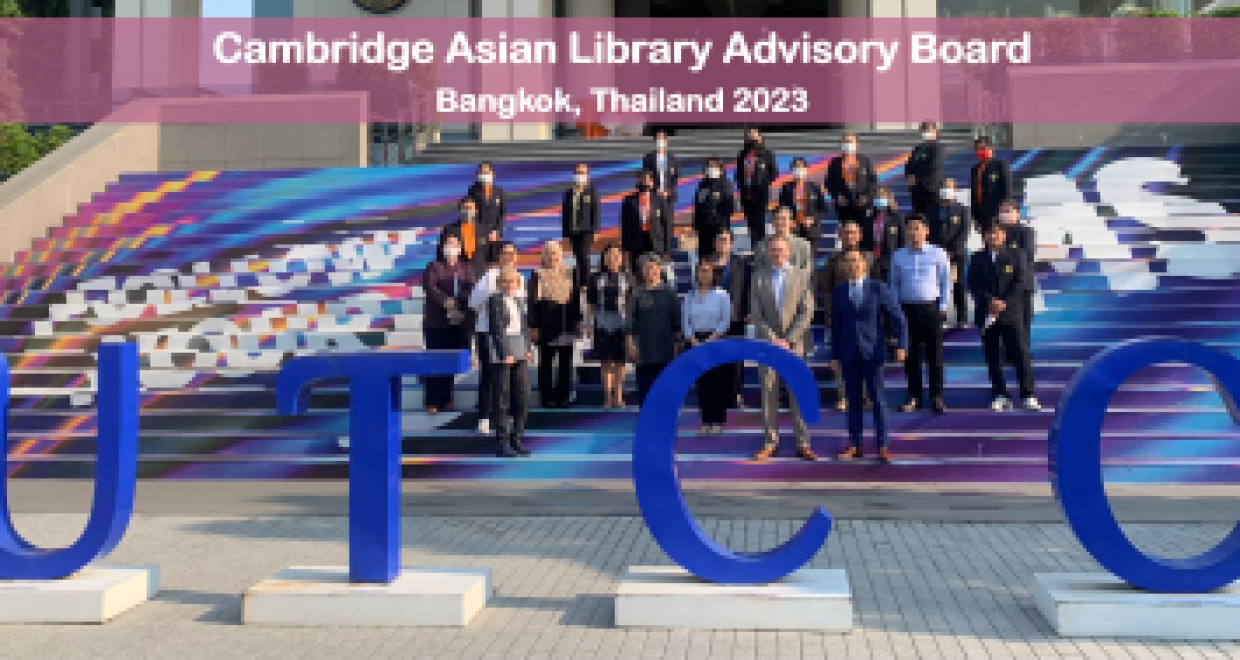Dr Jomkwan Polparsi and the University of the Thai Chamber of Commerce
This year’s Cambridge Asian Librarian Advisory Board [CALAB] meeting was kindly hosted by Dr Jomkwan Polparsi, librarian at the University of the Thai Chamber of Commerce [UTCC]. That a chamber of commerce might have the reach and funding to create a university is fascinating to someone who comes from the UK, as I don’t believe we have anything similar. I asked Jom (as she prefers to be known) about the history of the university.

She said that even in Thailand her university is unique. It was established in 1940 as the College of Commerce by the Thai Chamber of Commerce and its ultimate goals were to develop the best and most relevant education for business leaders and entrepreneurs, as well as serving national and international networks by providing the knowledge and resources required to foster business and industry. Staying true to its roots, UTCC’s current mission statement reads “UTCC is the top university in trade and services in ASEAN” and it remains the only university that has strong links to a national Chamber of Commerce.
Academic programmes at UTCC are based on those offered by the world’s top universities, including the MIT REAPUSA curriculum and those of the Harbour Space University (Barcelona) and the Design School at Stanford University. UTCC is the first Thai university to collaborate officially with Alibaba.com and become certified an authorized Alibaba.com e-commerce training centre, accelerating the capability of Thai SMEs to expand business globally. It offers more than fifty undergraduate programs in Business, Accountancy, Economics, Humanities and Applied Arts, Science and Technology, Communication Arts, Engineering, Law, Tourism and Services, Early Childhood Education, Entrepreneurship, and eSports Management and Marketing. The UTCC International School of Management, or ISM (formerly the International College), offers world-class bachelors’, masters’, and doctoral degrees, including on-line degree programmes which are attended by students from throughout the world.
UTCC is the first Thai university to offer international programmes in Yangon and Mandalay (both cities in Myanmar), relationships built through its strong connection to the Thai Chamber of Commerce. It is also the only Thai university to broadcast successfully TV shows on family business and entrepreneurship. Recently it has developed its Digital Hybrid Learning System [DHLS] and will shortly have installed an infrastructure based on 5G on campus. It has long been committed to the development of teaching and learning through technology, especially the use of the iPad.
Jom herself has worked at UTCC since 2012, when she was appointed Director of the Central Library, having first obtained her PhD in Library and Information Studies from the University of Wisconsin-Madison, USA. She says that teaching and research are her twin passions; among her achievements is the design of a new course in information and digital literacy for students and faculty members. In 2015 she also became the Assistant President for Information Technology, and Director of the UTCC Center for Teaching Excellence. At this time she also broadened her role of supporting Higher Education when she was appointed Chairperson for Education Resources and Technology of APHEIT (Association of Private Higher Education Institutions of Thailand), which currently has a membership of 64 universities. As well as belonging to CALAB, she has served on advisory boards as diverse as the UNESCO Media and Information Literacy 2019 project, the Thai Library Consortium, the Education ICT Forum Thailand (which was set up by by the Ministry of Science and Technology) and the Digital Technology User Group Association (DUGA). At present she is an active supporter of the “happy university” initiative, which aims to ensure quality of life for students, as well as lifelong learning and career advancement for students, library personnel, and alumni.
Asked what she feels to be the most pressing challenges for Thai libraries, Jom says that limited budgets create a situation in which renewals depend on robust usage statistics, but often these don’t reflect user needs. Effecting the digital transformation in all areas of teaching, learning and research also presents a challenge, though it is a positive one. She is less upbeat about continuing difficulties with personnel, observing that there is a shortage of librarians able and willing to take up posts in Thai libraries because many are retiring and some vacant posts can’t be filled owing to the “low output of graduates from library schools”. Also, private universities such as UTCC do not receive as much financial support from the government as public universities.
She is most proud of the library service innovations she has developed to assist users and her support for the “happy university” initiative; and, connected with this, professional development programmes she has put in place for library staff.
She thinks that some good will come from the problems being faced by universities and publishers alike in the present rapidly-changing teaching and research climate. She believes that the need to manage budgets with the greatest possible efficiency will lead to the development of new, more affordable pricing models by both parties, working in collaboration; that practical solutions to the human resources shortage will be found; that private universities in Thailand will discover opportunities for setting up a resource sharing network with government/public universities; and that there will be some adoption of international standards to aid users by helping to improve resources, metadata and personnel.







I am in search of management books